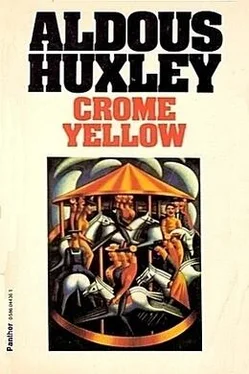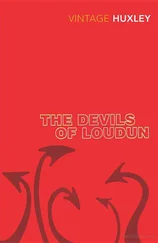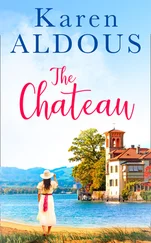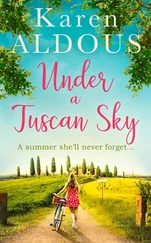"Is there going to be another war?" asked the old lady to whom he had predicted this end.
"Very soon," said Mr. Scogan, with an air of quiet confidence.
The old lady was succeeded by a girl dressed in white muslin, garnished with pink ribbons. She was wearing a broad hat, so that Denis could not see her face; but from her figure and the roundness of her bare arms he judged her young and pleasing. Mr. Scogan looked at her hand, then whispered, "You are still virtuous."
The young lady giggled and exclaimed, "Oh, lor'!"
"But you will not remain so for long," added Mr. Scogan sepulchrally. The young lady giggled again. "Destiny, which interests itself in small things no less than in great, has announced the fact upon your hand." Mr. Scogan took up the magnifying–glass and began once more to examine the white palm. "Very interesting," he said, as though to himself—"very interesting. It's as clear as day." He was silent.
"What's clear?" asked the girl.
"I don't think I ought to tell you." Mr. Scogan shook his head; the pendulous brass ear–rings which he had screwed on to his ears tinkled.
"Please, please!" she implored.
The witch seemed to ignore her remark. "Afterwards, it's not at all clear. The fates don't say whether you will settle down to married life and have four children or whether you will try to go on the cinema and have none. They are only specific about this one rather crucial incident."
"What is it? What is it? Oh, do tell me!"
The white muslin figure leant eagerly forward.
Mr. Scogan sighed. "Very well," he said, "if you must know, you must know. But if anything untoward happens you must blame your own curiosity. Listen. Listen." He lifted up a sharp, claw–nailed forefinger. "This is what the fates have written. Next Sunday afternoon at six o'clock you will be sitting on the second stile on the footpath that leads from the church to the lower road. At that moment a man will appear walking along the footpath." Mr. Scogan looked at her hand again as though to refresh his memory of the details of the scene. "A man," he repeated—"a small man with a sharp nose, not exactly good looking nor precisely young, but fascinating." He lingered hissingly over the word. "He will ask you, 'Can you tell me the way to Paradise?' and you will answer, 'Yes, I'll show you,' and walk with him down towards the little hazel copse. I cannot read what will happen after that." There was a silence.
"Is it really true?" asked white muslin.
The witch gave a shrug of the shoulders. "I merely tell you what I read in your hand. Good afternoon. That will be sixpence. Yes, I have change. Thank you. Good afternoon."
Denis stepped down from the bench; tied insecurely and crookedly to the tentpole, the Union Jack hung limp on the windless air. "If only I could do things like that!" he thought, as he carried the bench back to the tea–tent.
Anne was sitting behind a long table filling thick white cups from an urn. A neat pile of printed sheets lay before her on the table. Denis took one of them and looked at it affectionately. It was his poem. They had printed five hundred copies, and very nice the quarto broadsheets looked.
"Have you sold many?" he asked in a casual tone.
Anne put her head on one side deprecatingly. "Only three so far, I'm afraid. But I'm giving a free copy to everyone who spends more than a shilling on his tea. So in any case it's having a circulation."
Denis made no reply, but walked slowly away. He looked at the broadsheet in his hand and read the lines to himself relishingly as he walked along:
"This day of roundabouts and swings, Struck weights, shied cocoa–nuts, tossed rings, Switchbacks, Aunt Sallies, and all such small High jinks—you call it ferial? A holiday? But paper noses Sniffed the artificial roses Of round Venetian cheeks through half Each carnival year, and masks might laugh At things the naked face for shame Would blush at—laugh and think no blame. A holiday? But Galba showed Elephants on an airy road; Jumbo trod the tightrope then, And in the circus armed men Stabbed home for sport and died to break Those dull imperatives that make A prison of every working day, Where all must drudge and all obey. Sing Holiday! You do not know How to be free. The Russian snow flowered with bright blood whose roses spread Petals of fading, fading red That died into the snow again, Into the virgin snow; and men From all ancient bonds were freed. Old law, old custom, and old creed, Old right and wrong there bled to death; The frozen air received their breath, A little smoke that died away; And round about them where they lay The snow bloomed roses. Blood was there A red gay flower and only fair. Sing Holiday! Beneath the Tree Of Innocence and Liberty, Paper Nose and Red Cockade Dance within the magic shade That makes them drunken, merry, and strong To laugh and sing their ferial song: 'Free, free…!' But Echo answers Faintly to the laughing dancers, 'Free'—and faintly laughs, and still, Within the hollows of the hill, Faintlier laughs and whispers, 'Free,' Fadingly, diminishingly: 'Free,' and laughter faints away…Sing Holiday! Sing Holiday!"
He folded the sheet carefully and put it in his pocket. The thing had its merits. Oh, decidedly, decidedly! But how unpleasant the crowd smelt! He lit a cigarette. The smell of cows was preferable. He passed through the gate in the park wall into the garden. The swimming–pool was a centre of noise and activity.
"Second Heat in the Young Ladies' Championship." It was the polite voice of Henry Wimbush. A crowd of sleek, seal–like figures in black bathing–dresses surrounded him. His grey bowler hat, smooth, round, and motionless in the midst of a moving sea, was an island of aristocratic calm.
Holding his tortoise–shell–rimmed pince–nez an inch or two in front of his eyes, he read out names from a list.
"Miss Dolly Miles, Miss Rebecca Balister, Miss Doris Gabell…"
Five young persons ranged themselves on the brink. From their seats of honour at the other end of the pool, old Lord Moleyn and Mr. Callamay looked on with eager interest.
Henry Wimbush raised his hand. There was an expectant silence. "When I say 'Go,' go. Go!" he said. There was an almost simultaneous splash.
Denis pushed his way through the spectators. Somebody plucked him by the sleeve; he looked down. It was old Mrs. Budge.
"Delighted to see you again, Mr. Stone," she said in her rich, husky voice. She panted a little as she spoke, like a short–winded lap–dog. It was Mrs. Budge who, having read in the "Daily Mirror" that the Government needed peach stones—what they needed them for she never knew—had made the collection of peach stones her peculiar "bit" of war work. She had thirty–six peach trees in her walled garden, as well as four hot–houses in which trees could be forced, so that she was able to eat peaches practically the whole year round. In 1916 she ate 4200 peaches, and sent the stones to the Government. In 1917 the military authorities called up three of her gardeners, and what with this and the fact that it was a bad year for wall fruit, she only managed to eat 2900 peaches during that crucial period of the national destinies. In 1918 she did rather better, for between January 1st and the date of the Armistice she ate 3300 peaches. Since the Armistice she had relaxed her efforts; now she did not eat more than two or three peaches a day. Her constitution, she complained, had suffered; but it had suffered for a good cause.
Denis answered her greeting by a vague and polite noise.
"So nice to see the young people enjoying themselves," Mrs. Budge went on. "And the old people too, for that matter. Look at old Lord Moleyn and dear Mr. Callamay. Isn't it delightful to see the way they enjoy themselves?"
Denis looked. He wasn't sure whether it was so very delightful after all. Why didn't they go and watch the sack races? The two old gentlemen were engaged at the moment in congratulating the winner of the race; it seemed an act of supererogatory graciousness; for, after all, she had only won a heat.
Читать дальше











